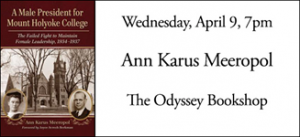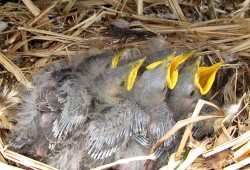submitted by Bonnie Stretch
Ann Karus Meeropol – A Male President for Mount Holyoke College: The Failed Fight to Maintain Female Leadership, 1934-1937
A struggle arose over who would succeed Mary Emma Woolley as president of Mount Holyoke College in 1937. Over her 36-year tenure, Woolley had transformed Mount Holyoke into an elite women’s college in which leadership in the administration and faculty was almost exclusively female. Beginning in 1933, a group of male trustees determined to change the college. This book tells the story of how this group dominated the search process and ultimately convinced the majority of the trustees to offer the presidency to Roswell Gray Ham, an associate professor of English at Yale University.

Ann Karus Meeropol has a doctorate in the history of higher education from the University of Massachusetts at Amherst. A former Mount Holyoke College LITS Scholar-in-Residence, she lives in Putnam County, New York.
3/12/2014 About this book comes an interesting note from Ruth Vars Barnes:
I was very interested to read about this book, as just very recently at my Elk Springs Book Group here in Glenwood Springs, CO, I met a woman whose mother had gone to MHC. She was thrilled to have someone to share some MHC memorabilia of her mother’s. She brought a folder for me last week to read. Her mother, Barbara Louise Waugh, class of ’45, coordinated an Aspen Conference entitled, “Western Horizons – Global Futures” ‘Rigor and Wisdom in Environmental Decision Making’ – Aspen, CO July 23-26, 1987. It was celebrating the Sesquicentennial Anniversary. It had a stellar roster of speakers. One of those included was John Gille, husband of Ellen Fetter Gille ‘61! He spoke on ‘The Global Ozone Layer’.
Also included in this MHC folder that she loaned to me was a brochure from the Sesquicentennial entitled, “An Historical Map of Mount Holyoke College 1837 – 1987”. It is fascinating to see the maps and description of buildings throughout those years on one side, and then on the other side the Growth of the Campus with separate sections entitled, “Mary Lyon, founder. Principal 1837-1849”; Years of Transition. 1849-1889; Elizabeth Storrs Mead, President, 1890-1900; Mary Emma Woolley, President, 1901-1937; The Modern Period. 1937-1987. I knew some of this history, but a lot was new to me. My older daughter graduated in ’88 – but I’d not seem this brochure.
When we arrived at MHC, I knew of Roswell G. Ham, because he had a summer home in RI, near where I had grown up. And then, I got to know Richard Glenn Gettell fairly well, when I invited him to be my ‘father’ for Father-Daughter weekends our junior and senior years. I’m really interested in what you learn about the ‘politics’ of appointing a male president.
I’m also getting to know my fellow book group member, and am wondering about all the memorabilia she has. She did not go to a woman’s college – she’s younger than we are. I know that MHC might like to have some of these materials. Originally, she was excited to share some of it with me – also because both my daughters have gone to MHC. She and her husband will be building a home in this area where we live. Any suggestions you might have– as time passes – for encouraging her to give some materials for the archives at MHC??? What is MHC looking for? Who is in charge of that now?
Many thanks. Ruth (Ruth Vars Barnes)





You must be logged in to post a comment.